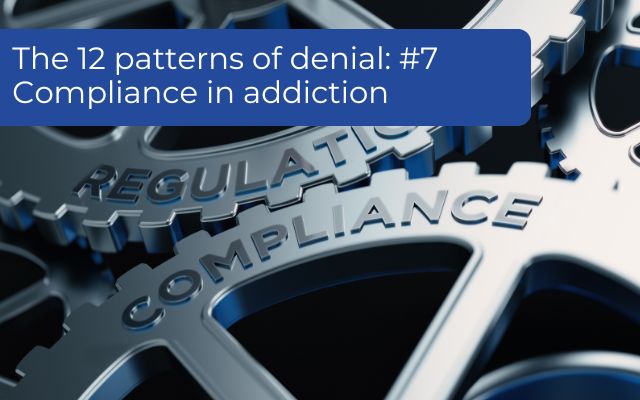In this blog we will look at the process of compliance in addiction, particularly in rehabilitative treatment. People with addiction or substance abuse problems use different forms of denial to keep themselves in the addictive cycle. Denial can be a dysfunctional protection mechanism which you may use to protect yourself from having to recognise, deal with and accept the reality of what is occurring in your life. This is often unconscious.
To recover from addiction, it is incredibly important to be able to identify denial. The 12 patterns of denial were developed by international addiction expert Terence Gorski – one of which is rationalising. Read on to find out more about how people with chemical dependency use compliance as a denial strategy to safeguard their addictive behaviours.
What is Denial in Addiction?
Denial is the first issue to address when addicted persons enter treatment or try other ways of recovering from their substance use disorder.
Denial is when someone
- Ignores reality
- Downplays reality
- Distorts reality
Reality is painful and difficult, and the addict turns to substances or other addictive behaviours to cope – i.e., to escape.
In the words of Dr Diamond: “The addict cannot tolerate reality… Neither internal reality nor external reality”. “They find reality repugnant, uncomfortable, and overwhelming, and prefer, like the psychotic, withdrawal into fantasy, bliss, or oblivion over reality.”
The first of the 12 steps of Alcoholics Anonymous, and other 12-step programmes, is completely geared at confronting and overcoming denial: We admitted that we were powerless over alcohol/drugs – that our lives had become unmanageable.
Without truly confronting and overcoming denial, no matter how much you want to get better, denial will trip you up and prevent you from recovering. This can be a tricky process because denial comes in so many forms and has become so normalised to the addict that they struggle to even recognise when they are using a given pattern of denial.

What is Compliance in Addiction?
“I’ll pretend to do what you want, if you’ll leave me alone”
Compliance is when a person with substance abuse problem does the ‘right’ things or says what they are expected to say in order to convince others, and even themselves, that they are getting better and are in recovery.
This often happens in addiction treatment when patients ‘go through the motions’ or ‘tick boxes’ by doing what is expected of them instead of engaging honestly in the therapeutic process.
A person might behave and follow the rules in treatment in order to ‘get people off their back’ and fly under the radar with little attention being brought to themselves and their problems.
While the person who is complying is doing the right things, he or she is not guided by genuine motives to get better and enter recovery. This compliance only serves to delay the healing process as they will eventually have to get honest and face their problems when they decide they want to get better down the line.
Complying is different from accepting. Accepting is a genuine form of surrendering to the reality of your situation and a programme of recovery.
In this blog we described what compliance in addiction denial looks like and how it works to keep addicted individuals sick and in the addictive cycle.
“To pretend not to care is more dangerous than not to actually care” –Charles Mwakio
Is your loved one in denial? Contact us for an obligation-free assessment today.
Read more about the 12 patterns of denial below:


